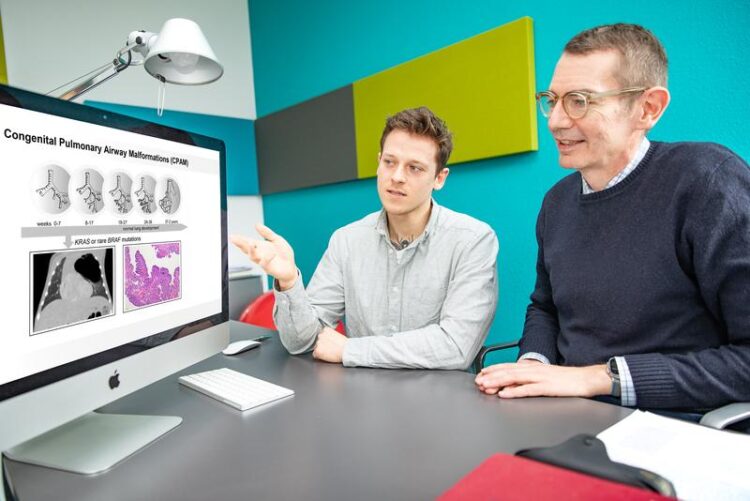Cause of rare congenital lung malformations

Hypothesis confirmed: Jonas Windrich (left) and Professor Kratz now know more about the cause of congenital lung malformations.
Copyright: Karin Kaiser / MHH
Gene mutations in the RAS-MAPK signaling pathway disrupt lung development in the womb.
Most rare diseases are congenital – including CPAM (congenital pulmonary airway malformations). These are airway malformations of the lungs that can lead to severe breathing problems in some affected newborns and can be associated with an increased risk of lung cancer. Researchers at Hannover Medical School (MHH) and Magdeburg University Hospital (UMMD) have now succeeded in identifying the genetic causes of the disease in a study.
Cysts penetrate the lung tissue
Although CPAM is rare, it is one of the most common congenital lung malformations. There are different types of the disease, which develops during the embryonic phase in the womb. In the most common form, the lung tissue is riddled with large cysts, the growth of which can have a negative impact on the newborn’s blood circulation and breathing. If this is the case, the affected children must be operated on at an early age.
Tracking down the cause
In the search for the cause of CPAM, the research team pursued the following hypothesis: Variants in cancer-associated genes of the so-called RAS-MAPK signaling pathway, which occur in the lung epithelium during prenatal lung development, are responsible for the lung malformations. These variants disrupt normal lung development and lead to maldevelopment in affected lung sections, resulting in a malformation of the lung.
Hypothesis confirmed
In their study, the scientists examined CPAM tissue samples from a total of 43 children histologically and genetically. All of these children had undergone surgery for CPAM at the Department of Pediatric Surgery at the MHH over the past 20 years. Surgery for lung malformations is one of the clinic’s core competencies. The result of the genetic analysis: variants in genes of the RAS-MAPK signaling pathway were detected in the tissue samples of almost 60 percent of the young patients – confirming the research team’s hypothesis. The KRAS gene in particular was affected by variants. The children with a KRAS variant had a statistically more severe course of the disease than children without it.
Results contribute to better diagnostics
The work was published in the American Journal of Respiratory and Critical Care Medicine. “The results are clinically important, they contribute to a better diagnosis of CPAM and may also improve the treatment of the disease,” explains Professor Dr. Christian Kratz, Director of the Department of Paediatric Haematology and Oncology and initiator of the study. “The publication was only possible thanks to the fantastic collaboration between the many people involved from different institutes and clinics,” he emphasizes. Dr. Denny Schanze, Head of Laboratory at the Institute of Human Genetics Magdeburg, adds: “The use of modern ultra-deep NGS sequencing methods was essential for the successful elucidation of the genetic cause of the disease.” The first author of the study is Jonas Windrich, a tenth-semester medical student. The work was carried out as part of his doctorate. “I learned a lot about scientific work from the project and I definitely want to combine my future work as a doctor with research,” says Windrich.
Cooperation between Hanover and Magdeburg
At the MHH, the Clinic for Pediatric Hematology and Oncology, the Institute of Pathology, the Clinic for Pediatric Pneumology, Allergology and Neonatology, the Clinic for Pediatric Surgery and the Pediatric Radiology Department of the Institute for Diagnostic and Interventional Radiology were involved in the study. The Institute of Human Genetics at Magdeburg University Hospital was also involved.
You can find the original paper here: https://www.atsjournals.org/doi/10.1164/rccm.202311-2163LE
For further information, please contact Professor Dr. Christian Kratz, kratz.christian@mh-hannover.de.
Media Contact
All latest news from the category: Health and Medicine
This subject area encompasses research and studies in the field of human medicine.
Among the wide-ranging list of topics covered here are anesthesiology, anatomy, surgery, human genetics, hygiene and environmental medicine, internal medicine, neurology, pharmacology, physiology, urology and dental medicine.
Newest articles

Trotting robots reveal emergence of animal gait transitions
A four-legged robot trained with machine learning by EPFL researchers has learned to avoid falls by spontaneously switching between walking, trotting, and pronking – a milestone for roboticists as well…

Innovation promises to prevent power pole-top fires
Engineers in Australia have found a new way to make power-pole insulators resistant to fire and electrical sparking, promising to prevent dangerous pole-top fires and reduce blackouts. Pole-top fires pose…

Possible alternative to antibiotics produced by bacteria
Antibacterial substance from staphylococci discovered with new mechanism of action against natural competitors. Many bacteria produce substances to gain an advantage over competitors in their highly competitive natural environment. Researchers…





















